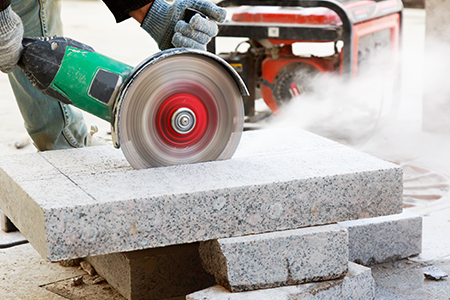
11 July 2023
SafeWork SA inspectors will again be inspecting workplaces that fabricate engineered stone to ensure silica dust exposure is being adequately managed so workers are afforded the highest levels of health and safety protection.
Airborne silica dust is commonly found in workplaces involved in the fabrication and installation of engineered stone. Silica dust generation is also found in the construction and mining industry.
Respirable crystalline silica (also known as RCS or silica dust) has received increased attention recently due to the tragic rise in the number of workers being exposed to silica dust and diagnosed with silicosis.
Silicosis is a lung disease mainly caused by inhaling silica dust, a mineral commonly found in certain types of rock, soil and engineered stone. Silicosis can lead to irreversible health effects and death.
RCS exposure occurs where silica dust is created when cutting, drilling, grinding or polishing certain types of stone, rock, sand and clay.
The six-month compliance campaign will run from July to December 2023.
SafeWork SA previously conducted audits on silica dust exposure during 2019 and 2020–2021.
The 2019 respirable crystalline silica audit report identified that workplaces were non-compliant with respect to air monitoring requirements. Air monitoring must be conducted if there is any uncertainty as to whether the exposure standard is being exceeded or where they can't work out if there's a risk to workers health without air monitoring.
Workplaces that were previously issued with statutory notices during the 2021 respirable crystalline silica campaign will be revisited to ensure that they have maintained safe systems of work to minimise RCS exposure in the workplace.
SafeWork SA inspectors will be issuing statutory and expiation notices in workplaces that are non-compliant.
The inspectors will also provide advice, information and education in relation to minimising the risk of RCS exposure to workers.
Businesses and workers must ensure safe systems of work are developed, implemented, and maintained to minimise the risks associated with RCS.
A person conducting a business or undertaking (usually an employer) must ensure that no person is exposed to a substance or mixture in airborne concentration that exceeds the exposure limit for the substance or mixture.
Executive Director Glenn Farrell said exposure to silica dust can cause dangerous and irreparable health effects and is often entirely preventable.
‘Workers deserve to feel safe and protected on the job and to live happy and healthy lives with their families and loved ones, and not to deal with the shattering effects of this debilitating respiratory condition.
'It is the responsibility of the business to educate themselves about the workplace exposure limits for silica dust and ensure that they conduct air monitoring to control their dust exposure levels. There is lots of readily available information that has been developed to assist businesses to effectively manage silica dust, so there are no excuses if workers are being exposed due to poor compliance.’
Further links


